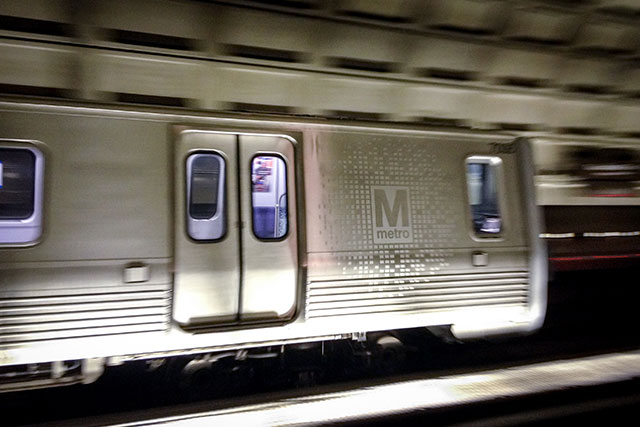
(ep_jhu/Flickr)
Metro is fundamental to metropolitan Washington’s mobility, economy, and sustainability, and COG has a long history of helping ensure the system is in a strong position to serve the region.
FY 2025 BUDGET COORDINATION AND DMVMOVES
Starting with its 2023 Annual Leadership Retreat, COG began convening representatives of the governors of Maryland and Virginia and the mayor of the District of Columbia along with local government officials to help address the major deficit Metro was facing for the system’s Fiscal Year 2025 budget and beyond due to federal transit relief expiring, costs rising with inflation, and shifts in commuting patterns since COVID. This collaboration among government officials, regional organizations, and Metro forged consensus on several actions by the transit agency to reduce costs and raise revenues, while area jurisdictions enhanced their subsidies to the system, resulting in an approved budget and avoiding devastating service cuts.
Officials acknowledged that while the region succeeded in dealing with the immediate FY 2025 budget crisis, a more comprehensive effort was needed to focus on metropolitan Washington’s long-term transit needs and the longstanding, systemic funding challenges facing Metro and the region’s other transit systems. In May 2024, the COG and Metro Boards of Directors held a historic joint meeting and agreed to partner on a new initiative, DMVMoves, to create a unified vision and sustainable funding model for the region’s transit network.
Over the next year, a task force of officials appointed by COG and Metro are guiding this initiative alongside two workgroups representing area jurisdictions, transit service providers and agencies, and business, labor, and community organizations. To learn more, visit the DMVMoves website.
PAST INITIATIVES
After the debut of Metrorail and amid concerns about future construction costs, COG and the Transportation Planning Board carried out a major analysis in 1976 of the costs of completing the original 103-mile system. The Metrorail Alternatives Analysis concluded that finishing the rail system would be a sound investment and was the first of several major studies regional leaders asked COG to undertake, such as the reports of the Blue Ribbon Metro Funding Panel in 2005 and the Joint WMATA Governance Review Task Force in 2010.
COG helped the region forge consensus and lay the groundwork for the landmark Metro dedicated capital funding agreement in 2018 along with public, private, and civic sector partners. COG also created the Washington Metrorail Safety Commission on behalf of the states and has coordinated with Metro and area fire departments to develop new safety protocols and improved emergency communications.